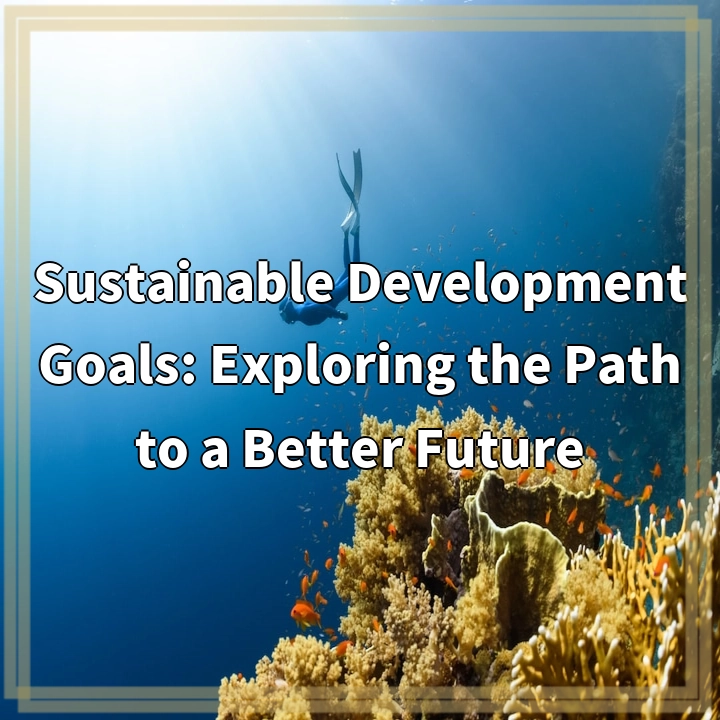Physical Address
304 North Cardinal St.
Dorchester Center, MA 02124
Physical Address
304 North Cardinal St.
Dorchester Center, MA 02124

Sustainable Development Goals (SDGs) are a set of global goals established by the United Nations (UN) with the aim of addressing social, economic, and environmental challenges worldwide. Adopted in 2015 as a successor to the Millennium Development Goals (MDGs), the SDGs consist of 17 interconnected goals and 169 targets to be achieved by 2030.
One of the main challenges faced in achieving the SDGs is the limited progress and implementation at both the national and global levels. Insufficient political will, lack of funding, and weak institutional frameworks hinder progress towards achieving the goals.
Addressing inequalities is a fundamental aspect of sustainable development. However, various forms of inequalities persist in many parts of the world, including income inequalities, gender disparities, unequal access to education and healthcare, and marginalization of certain social groups. These disparities pose significant challenges in achieving several SDGs related to poverty alleviation, quality education, gender equality, and reduced inequalities.
Environmental degradation and climate change present significant challenges to achieving the SDGs. Rising temperatures, deforestation, biodiversity loss, and pollution pose substantial threats to ecosystems and livelihoods. Climate change exacerbates existing vulnerabilities, affecting agriculture, water resources, and human health, among other areas. Achieving SDGs related to sustainable cities, climate action, responsible consumption, and life below water and on land requires robust efforts to address these environmental challenges.
Achieving the SDGs requires global partnerships and cooperation among governments, international organizations, civil society, and the private sector. However, fostering effective partnerships and collaboration remains a challenge. Differences in priorities and interests, lack of coordination, and limited resources can hinder the implementation of collaborative projects and initiatives essential for achieving the goals.
Monitoring progress towards the SDGs is crucial for assessing the effectiveness of policies and interventions. However, inadequate data availability and quality pose challenges in tracking and evaluating progress. Many countries lack the necessary data collection mechanisms, making it difficult to measure progress accurately and identify areas that require attention and intervention.
To address the limited progress in achieving the SDGs, it is crucial to enhance implementation efforts at the national and global levels. This involves strengthening political will, incentivizing governments to prioritize the goals, and allocating adequate resources for their implementation. Additionally, establishing clear accountability mechanisms and monitoring progress regularly can help drive action and ensure commitment to achieving the goals.
Addressing inequalities requires targeted interventions across multiple dimensions. Governments and organizations can implement policies that promote inclusive growth, equal access to education and healthcare, and gender equality. Efforts should focus on reducing income disparities, empowering marginalized communities, and fostering social cohesion. Multi-stakeholder partnerships and collaborations can play a significant role in supporting initiatives that aim to reduce inequalities and ensure that no one is left behind.
To combat environmental challenges, robust measures are needed to promote sustainable environmental practices and mitigate climate change impacts. This includes adopting renewable energy sources, promoting sustainable land use and resource management, and implementing effective waste management strategies. Encouraging eco-friendly behaviors, supporting conservation efforts, and advocating for policies that prioritize environmental sustainability are essential for achieving the SDGs related to the environment and climate action.
Enhancing global partnerships and collaboration is critical in achieving the SDGs. Governments, international organizations, civil society groups, and the private sector must work together to share knowledge, experiences, and resources. Encouraging dialogue and cooperation, fostering innovative financing mechanisms, and creating platforms for collaboration can help overcome barriers and promote effective implementation of SDG-related initiatives.
To accurately track progress and identify areas that need attention, there is a need for improved data collection and monitoring mechanisms. Governments should invest in reliable data systems and strengthen statistical capacities to measure progress effectively. Collaboration among countries, UN agencies, and other stakeholders can support the sharing and exchange of data and best practices, enabling more informed decision-making and targeted interventions.
The challenges associated with achieving the SDGs require comprehensive solutions that address implementation gaps, inequalities, environmental threats, partnership development, and data availability. By enhancing political commitment, addressing inequalities, fostering environmental stewardship, promoting collaboration, and improving data collection, we can make significant progress towards realizing the SDGs and creating a better future for all.
Sustainable Development Goals (SDGs)
If you’re wondering where the article came from!
#